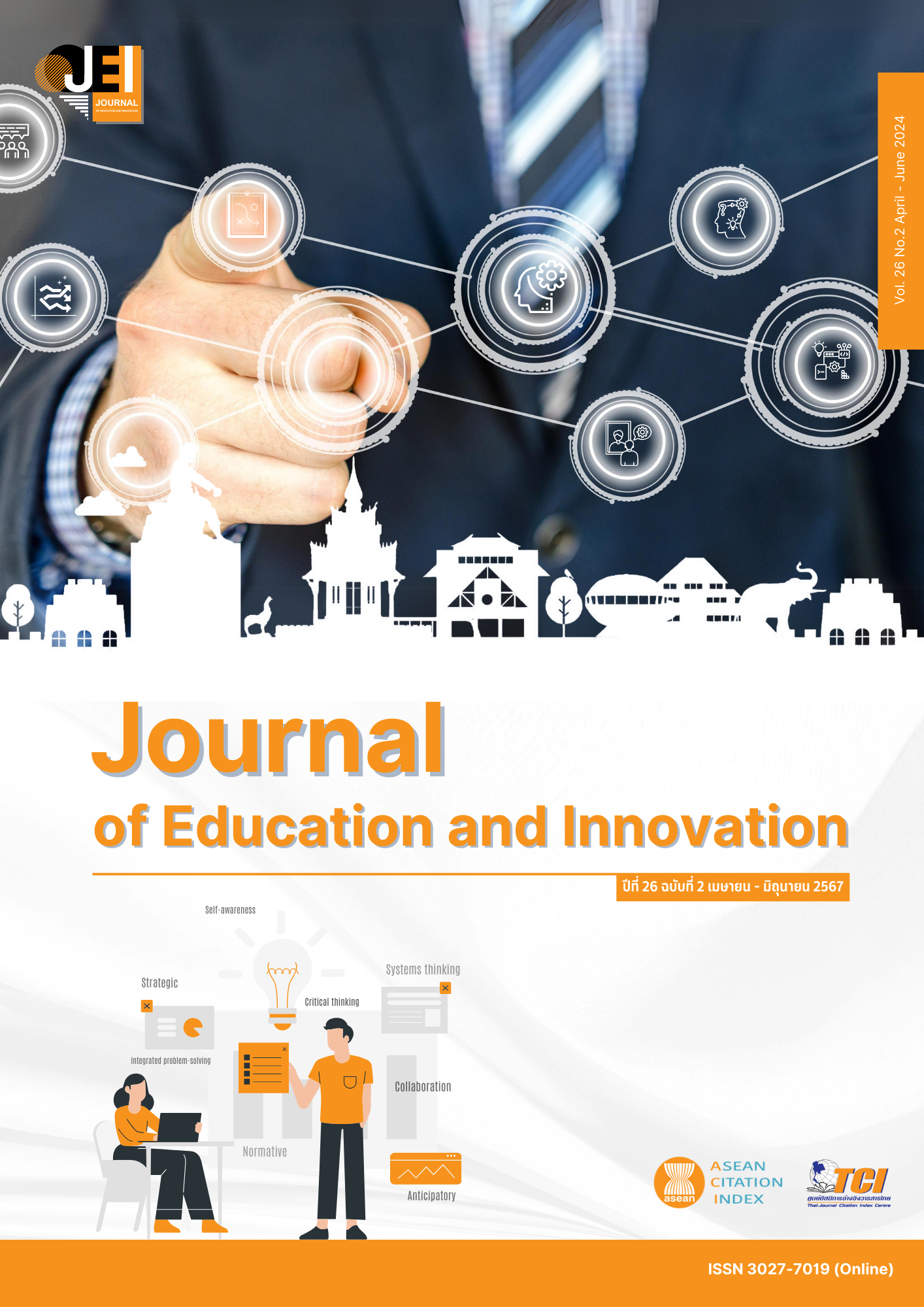THE DEVELOPMENT OF LOCAL LEARNING ACTIVITIES ACCORDING TO THE STEM EDUCATION APPROACH TO PROMOTE SCIENTIFIC SKILLS AND CREATIVE THINKING PROCESS FOR JUNIOR HIGH SCHOOL STUDENTS IN LAMPANG
Main Article Content
Abstract
The objectives of this research were to 1) design a local learning activity based on STEM education for junior high school students, 2) study scientific process skill development for junior high school students who received local learning activities based on STEM education, and 3) study the creativity of junior high school students who has been organized the local learning activities based on STEM education. This research was a one-shot case study. The sample used in the research was selected by purposive, 14 students who studying in Mathayomsuksa 1 at a school in Mae Ta District, Lampang Province. The tools used in the research were; 1) a local learning management plan based on STEM education consisting of an upside-down tomato planting miracle activity, and tomato processing activities, 2) an integrated scientific process skills assessment form, and 3) creativity assessment form. The statistics used to analyze the data were mean and standard deviation. The research results showed that:
1. The results of the design of local learning activities based on STEM education. It was an integration of science teaching that was consistent with the local context where tomato cultivation is the main occupation in the community. There were 6 STEM education learning activities as follows: 1) problem Identification,
2) related Information searching, 3) solution design, 4) planning and development, 5) testing, evaluation and design improvement, and 6) presentation.
2. Integrated scientific process skills after receiving local learning activities according to STEM education in all 5 skills, including hypothesis, defining the operational definition of a variable, defining and controlling variables, experimenting and interpreting data, and conclusions, at a good level.
3. The creative thinking after receiving local learning activities according to STEM education in all 4 aspects, including fluent thinking, flexible thinking, originality and meticulous thought, at a good level.
Article Details

This work is licensed under a Creative Commons Attribution-NonCommercial-NoDerivatives 4.0 International License.
The owner of the article does not copy or violate any of its copyright. If any copyright infringement occurs or prosecution, in any case, the Editorial Board is not involved in all the rights to the owner of the article to be performed.
References
Chanprasert, S. (2013). Instructional management in science and essential skills in the 21st century. IPST Magazine, 42(185), 10-13.
Chamrat, S. (2017). The definition of STEM and key features of STEM education learning activity. STOU Education Journal, 10(2), 13-34.
Dachakupl, P., & Yindeesuk, P. (2005). Science methods for teaching general science. Bangkok: Develop Academic Quality.
Institute for the Promotion of Teaching Science and Technology. (2003). Organizing subjects for group learning. Science basic education curriculum. Bangkok: Institute for the Promotion of Teaching Science and Technology.
Jitraksil, W., Pansuppawat, T., & Choosup, N. (2018). Development of the science process skills using learning management of stem education entitled “Force, Motion, and Energy” science substance group, Mathayom Suksa 1. Journal of Curriculum and Instruction Sakon Nakhon University, 10(27), 87-97.
Joyce, B., & Weil, M. (1996). Model of teaching (5th ed.). Boston: Allyn and Bacon.
Klainin, S., Dejsri, P., & Pramojanee, A. (2006). Learning for Tomorrow's World. Executive summary report. Bangkok: S Plus Prepress System.
Koocharoenpisal, N., Kaewthip, K., Nongnuan, K., & Haritawan, P. (2017). Learning outcome of 9th students using the learning activity packages on the natural rubber latex process integrating science technology engineering & mathematics (STEM). Journal of Education Naresuan University, 19(1), 23-37.
Ministry of Education. (2008). Learning management of science subjects according to the basic education core curriculum, 2008. Bangkok: Agricultural Cooperative Assembly of Thailand Limited.
Ministry of Education. (2009). Basic Education Core Curriculum 2008. Bangkok: Thailand Agricultural Cooperative Assembly Printing House.
Ministry of Education. (2017). Basic Education Core Curriculum B.E. 2551 revised 2017. Bangkok: Agricultural Cooperative Assembly of Thailand Limited.
Office of the Permanent Secretary, Ministry of Education Ministry of Education. (2016). The 12th Education Development Plan of the Ministry of Education (2017 - 2021). Bangkok: Bureau of Policy and Strategy, Office of the Permanent Secretary, Ministry of Education.
Panich, W. (2013). Creating learning for the 21st century (2nd ed.). Bangkok: S. Charoen Phim.
Phonlek, S. (2020). Creative thinking development of Mathayomsuksa 4 students on the topic of chemistry of living organisms based on STEM education and sufficiency economy philosophy (Master thesis). Sakon NaKhon: Sakon NaKhon Rajabhat University.
Phuvipadawat, S. (2001). Creativity promotion techniques (6th ed.) Bangkok: Thai Wattana Panich.
Rattanahiran, T., & Sithsungnoen, C. (2020). Learning management by STEM education to develop science process skill and task creative ability of Matthayomsuesa 1 Students. Journal of Humanities and Social Sciences Review (JHSSR), 22(2), 20-33.
Roadrangka, W., & Dachakupl, P. (1999). Process skills activities for teachers. Bangkok: Quality of Life Development Institute.
Siripatharachai, P. (2013). STEM Education and 21st century skills development. Journal Executive, 33(2), 49-56.
Songkhwae, P., & Onthanee, A. (2017). Development of stem learning units to enhance scientific literacy in the topic of preservation land and rock of maehongson for prathomsuksa 6 students. Journal of Education Naresuan University, 19(3), 210-224.
Srisa-ard, B. (2002). Preliminary research (7th ed.). Bangkok: Chulalongkorn.
Sutharat, W. (2004). Ideas and creativity. Bangkok: Suweeriyasan.
Yıldırım. (2018). STEM applications in mathematics education: The effect of STEM applications on different dependent variables. Turkey: Mus Alparslan University.


